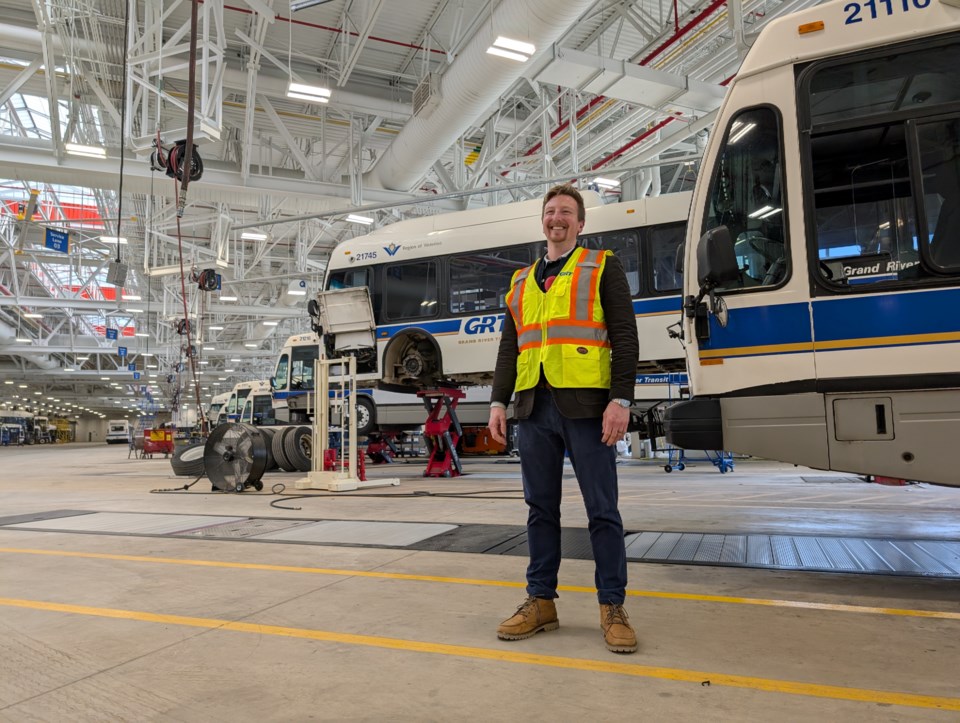Regional councillors Pam Wolf and Doug Craig think Cambridge deserves to be a greater priority in Grand River Transit's 10-year business plan.
"The frustration in Cambridge is the length of time it takes to get anywhere," said Wolf at the region's sustainability, infrastructure and development committee yesterday.
Her comments came after staff outlined a plan that aims to expand the transit network's service area to make it "the easy transportation choice for more people."
By 2035, GRT wants to increase service hours by 63 per cent, boost ridership by 27 per cent and enhance the network with 60-foot articulated buses, 10-minute frequency, airport service, highway connections, and 24-hour-a-day, seven-day-a-week service on some routes.
The annual cost to operate a fully implemented plan is estimated to be $315 million and upgrades would save riders over 20 minutes on Cambridge to Waterloo trips.
Wolf applauded the positive goals in the plan, but said Cambridge deserves more.
"The transportation system, although I agree it's getting better, is not good enough," she said.
"We desperately need a GO train, a GO bus, rapid transit, an ION."
She doesn't believe they should be a lesser priority than the new Kitchener transit hub or GO station in Breslau.
"I don't see the priority for Cambridge and we've waited long enough," she said.
In response, acting commissioner of transportation services Doug Spooner pointed to a recent Cambridge network redesign that resulted in increases in ridership and "obvious time savings."
He said it has demonstrated a growing transit culture in Cambridge and he's excited about what's in store for the city in terms of transit upgrades over the next 10 years.
But another concern raised by Wolf and Craig is the fact city residents have been "paying for the ION from day one" and still don't have access to light rail transit service.
Mayor Jan Liggett agreed, saying she was blown away and disturbed after learning how many millions of Cambridge taxpayer dollars have gone toward LRT.
Wolf contends there are more residents demanding transit service between Cambridge and Guelph and Cambridge and Toronto than there are using the ION bus, which was part of the justification for area-rating Cambridge taxpayers.
The business plan for Stage 2 of the LRT, which is considered a separate project and not part of the GRT's business plan, will be coming back to council in November, Spooner said.
It will include an option to create rapid bus transit service to the Ainslie Street terminal instead of light rail.
That point seemed to irk Craig who said rapid buses were never on the table for Stage 1. "It was LRT all the way."
"I'm interested to see how this is all going to play out," he said, adding he thinks it's imperative to bring Cambridge up to the same status of frequency for LRT and GO train in the GRT business plan.
In terms of passenger rail service, Cambridge is the largest unserved commuter corridor outside of the Greater Hamilton and Toronto Area.
The region's business case for Cambridge to Guelph GO rail service, another separate project, is now in the hands of Metrolinx to consider.
It asks Metrolinx to supply a GO bus from Cambridge to Guelph in the interim.
"I think that should be a top priority, if not the top priority. Because this has been going on for years of waiting for this system to come in," Craig said
He asked staff to provide an explanation of the philosophy behind area-rating Cambridge to pay for Stage 1 when the business plan returns in June.
Despite all the concern about Cambridge being neglected in the plan, one major focus specific to Cambridge is a goal to build a $250 million bus maintenance facility to replace the old garage on Conestoga Boulevard. It is among $798 million in major transit capital projects identified in the plan.
Acting director of transit services Neil Malcolm said GRT is rapidly outpacing capacity at the old garage and said he expects the new garage will be similar in size to the Northfield Drive facility in Waterloo, which is over 300,000 square feet.
It's still a few years down the road, however, with a timeline to construction hinging on finding a suitable location, procuring land and securing funding from upper levels of government, Malcolm said.
The business plan will be presented again during a community engagement meeting in regional council chambers on April 16.
It will be followed by presentations to area municipal councils before a final version of the plan returns to the committee in June for adoption.



.png;w=120;h=80;mode=crop)
